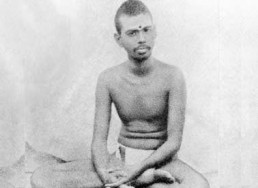Arunachala Pancharatnam
விரிகதிரால் யாவும் விழுங்கு – மருண
கிரிபரமான் மாவே கிளருளப்பூ நன்றாய்
விரிபரிதி யாக விளங்கு. 1
Viri-kadi-rāl yāvum vizhun-gum – Aruna
Giri-paramān māvē kilar-ulappu nandrai
Viri-paridi yāga vilangu. 1
யுத்திதமாய் நின்றே யொடுங்கிடுமா-னித்தியமு
நானென் றிதய நடித்திடுவை யாலுன்பேர்
தானிதய மென்றிடுவர் தாம். 2
Uttida-māi nindrē odungi-dumāl – nittiya-mum
Nanen drida-yam naḍit-tiḍuvai yālunper
Tāni-dayam endri-duvar tām. 2
லகமிதுதா னெங்கெழுமென் றாய்மூதே-யகவுருவை
நன்கறிமூது முழூநீர் நதிபோலு மோயுமே
யுன்கணரு ணாசலனே யோர். 3
Ahamidu-tan engezhu-men draindē – ahavu-ruvai
Nanga-rindu munnīr nadi-pōlum ōyumē
Unkan-Arunā chalanē yör. 3
வளியடக்க நிற்கு மனத்தா—லுளமதனி
லுன்னைத் தியானித்து யோகி யொளிகாணு
முன்னி லுயர்வுறுமீதுன். 4
Vali-yadakka nirku manat-tāl – uļama-danil
Unnai dhiya-nittu yōgi oli-kāņum
Unnil uyar-vurumi dun. 4
முன்னைக்கண் டெல்லாமு முன்னுருவா—யன்னியமி
லன்புசெயு மன்னோ னருணாச லாவெல்கு
மின்புருவா முன்னிலா ழ்மூதே. 5
Unnaik-kan dellā-mum unnuru-vāi – anni-yamil
Anbu-seyum annōn Aruṇā-chalā velgum
Inbu-ruvām unnil āzhndē. 5
வருமறையமூ தக்கருத்தே யாகு-மருணா
சலபஞ் சகமணியைத் தண்டமிழ்வெண் பாவா
லுலகுக் களித்தா னுவமூது.
Aru-maraiyan dak-karuttē yāgum — Aruṇā
Chalapan chaka-maṇiyai taṇ-ṭamizhveṇ bāvāl
Ulagu kalit-tan uvandu.
அரியாதியி தரசீவர தகவாரிச குகையில்
லறிவாய்ரமி பரமாத்தும னருணாசல ரமணன்
பரிவாலுள முருகாநல பரனார்மூதிடு குகையார்மூ
தறிவாம்விழி திறவாநிச மறிவாயது வெளியாம்.
Ariyādi yidara-jīvara daha-vārija guhai-yil
Arivai-rami paramāt-tuman Aruṇāchala Ramaṇan
Parivā-luļa muru-gānala paranārn-diḍu guhai yārndu
Arivam-vizhi tiṛavā-nijam aṛivā-yadu veliyām.

Description
Arunachala Pancharatnam
Introduction by Sri Michael James
Sri Arunachala Pancharatnam, the ‘Five Gems to Sri Arunachala’, is the only song in Sri Arunachala Stuti Panchakam that was not originally composed in Tamil. Sri Ramana composed it first in Sanskrit, and only later in Tamil.
One day in 1917 a devotee asked Sri Ramana to compose a Sanskrit verse in the arya vritta metre, in answer to which he composed the verse ‘karunapurna sudhabdhe …’ in flawless arya vritta. Soon afterwards this verse was shown to Kavyakanta Ganapati Sastri, a Sanskrit poet and scholar, who on seeing it at once requested him to compose another verse in the same metre. Sri Ramana accordingly composed the verse ‘tvayarunachala sarvam …’, on seeing which Ganapati Sastri asked him to compose three more verses on the subject of the four yogas — one on jnana yoga (the path of knowledge), then one on raja yoga (the path of mind-control), and lastly one on karma and bhakti yoga (the paths of unselfish action and devotion) — in order to form a poem of five verses. Accordingly in continuation of the ideas expressed in the first two verses, Sri Ramana wrote the next three verses.
Five years later, in 1922, when a devotee was printing the first four songs of the present Sri Arunachala Stuti Panchakam, someone asked Sri Ramana to translate Sri Arunachala Pancharatnam into Tamil, so he did accordingly.
Arunachala Pancharatnam Commentary by Sri Sadhu Om, translated by Michael James
Verse 1
O Ocean of Amrita (the ambrosia of immortality), which is the fullness of Grace ! O Arunagiri, the Supreme Self (paramatma) who swallow everything (the entire world-appearance) by the spreading rays (of the Light of Self-Knowledge) ! (Graciously) shine as the Sun of Self knowledge which will make (my), mind-lotus which is swelling (with love and ready to blossom), blossom fully. 1
Verse 2
O Red Hill (Arunachala)! All this (world-appearance), which is a picture, rises, stands and subsides only in You. Since You dance eternally (in) the Heart as (the Real Self), they (the Sages or Jnanis) say that Your name itself is Heart, (Hridayam). 2
Note : Just as the appearance and disappearance of a cinema-picture takes place only on the screen, so the rising (creation), the standing (sustenance) and subsidence (destruction) of the entire world-picture takes place only in Arunachala, the Self. However, Arunachala exists eternally without undergoing and without being affected even in the least by these seeming changes of creation, sustenance and destruction, dancing motionlessly in the Heart and as the Heart in the form of the pure, adjunctless consciousness ‘I’. Hence sages refer to Arunachala, the Self or Supreme Reality, by the name Heart.
Verse 3
O Arunachala ! Having scrutinized with that pure mind which is facing Self-wards (ahamukham) “where does this ‘I’ rise ?” and having (thereby) clearly known the form (or real nature) of ‘I’, one ceases to exist (by merging) in You like a river (which merges and loses its form) in the ocean. Know thus. 3
Verse 4
O shining Arunesa, Having given up (attending to) external objects (second and third persons) and having meditated upon You (the Self) in the heart with a mind which has become still by restraining the breath, the Yogi will see the Light (of Self knowledge) and will attain greatness in You (by thus uniting with You, the embodiment of all greatness). Know this. 4
It is also be noted that Sri Bhagavan mentions breath- restraint here only as a means by which (compare verse 16 of Upadesa Undiyar) the mind can make itself still. By itself breath restraint is not a means by which one can see the true light of Self-Knowledge; having become still by breath-restraint, the mind must then attend to Self in order to see the light of Self-Knowledge.
Verse 5
O Arunachala, he who, with a mind surrendered to You and seeing You always, without (a sense of) otherness loves everything as Your form, triumphs having drowned (and lost his individuality) in You (the self), who are the form of bliss. 5
Note : Though, the subject on which Sri Bhagavan was asked to compose this verse was Karma and Bhakti, He has in fact described in this verse only the state of final attainment, for it is only in that state that one can “see You always” (that is ; at all times and in all states, including sleep) and that one can “Love everything without otherness” (that is, without feeling anything to be other than oneself). In verse 10 of Upadesa Undiyar Sri Bhagavan says that to remain subsided in the place of one’s rising (that is, in one’s source, the self) is Karma, Bhakti, Yoga and Jnana. Accordingly in this present verse He teaches that to drown for ever in Arunachala, the Self, is the most perfect form of Karma and Bhakti.
Closing verses
Arunagiri – Ramana happily gave to the world through (these) pleasant Tamil venbas (verses in venba metre) the ‘Five Gems to Arunachala’. (Sri Arunachala Pancharatnam), which are (a revelelation of) the precious import of vedanta and which He (first) composed in sanskrit.
Note : This verse was composed by Sri Bhagavan as a concluding verse to the tamil version of Sri Arunachala Pancharatnam, and was adopted by Him from the concluding verse composed by Daivarata for the sanskrit version.
Arunachalaramana is the Supreme Self (Paramatman) who blissfully exists as consciousness (as the pure adjunctless consciousness “I am”) in the cave of the Heart- lotus of (all) different souls (jivas) beginning with Hari. When the mind melts with love and reaches the cave (of the heart) in which the benign Supreme dwells, the eye of (true) Consciousness will open and you will know (this) Truth, (for) it will (become manifest) reveal itself.
Other Ramana Shlokams
Aksharamanamalai
Akshara mana malai means the Scented garland arranged alphabetically in praise of Arunachala. Composed by Bhagavan Ramana, Arunachala” literally means “Mountain of the colour of red.
Anma Viddai
Anma-Viddai (Atma Viddai), the ‘Science of Self’, also known as Atma-Vidya Kirtanam, the ‘Song on the Science of Self’, is a Tamil song that Sri Ramana Maharshi composed on 24th April 1927.
Appala Pattu
Bhagavan Ramana Maharshi composed the Appala Pattu or The Appalam Song when his mother Azhagammal came to live with him. Lyrics In Tamil, English, Telugu with Translation, Meaning, Commentary, Audio MP3 and Significance
Arunachala Ashtakam
Sri Arunachala Ashtakam means the ‘Eight Verses to Sri Arunachala’. It was composed by Sri Ramana Maharshi as a continuation of Sri Arunachala Patikam.
Arunachala Mahatmiyam
Arunachala Mahatmiyam Arunachala Mahatmiyam means the Glory of Arunachala - By Bhagavan Ramana Maharshi The following notes describe the greatness of Arunachala as gi
Arunachala Navamani Malai
Arunachala Navamani Malai means The Garland or Necklace of Nine Gems in praise of Sri Arunachala. This poem of nine verses was composed by Bhagavan Ramana Maharshi himself, in praise of Arunachala, the Lord of the Red Hill.
Arunachala Padigam
Sri Arunachala Padigam (Padhikam) means the ‘Eleven Verses to Sri Arunachala’. It was composed by Sri Ramana Maharshi after the opening words of the first verse, 'Karunaiyal ennai y-anda ni' had been persistently arising in his mind for several…
Ekanma Panchakam
Ekanma Panchakam or Ekatma Panchakam means the ‘Five Verses on the Oneness of Self’, is a poem that Sri Ramana composed in February 1947, first in Telugu, then in Tamil, and later in Malayalam.
Ellam Ondre
Ellam Ondre - All Is One - Is a masterpiece by a Brahma Jnani Sri Vaiyai R Subramaniam about Advaita and path to attain the Unity. This book was highly recommended by Bhagavan Ramana Maharshi.
Saddarshanam
Saddarshanam is the Sanskrit Translation of Bhagavan Ramana Maharshi's Ulladu Narpadu, the Forty verses on Reality. The Tamil verses were translated into Sanskrit by Kavyakantha Ganapati Muni (Vasishta Ganapati Muni), who had also selected which…
Saddarshanam Telugu
This is the Telugu Transliteration of Saddarshanam from Sanskrit, which in turn is a translation of Bhagavan Ramana Maharshi's Ulladu Narpadu, The Forty on What Is.
The Path of Sri Ramana
The Path of Ramana, by Sri Sadhu Om, is a profound, lucid and masterly exposition of the spiritual teachings which Bhagavan Sri Ramana Maharshi graciously bestowed upon the world. The exact method of practicing the self-enquiry 'Who am I?' is…
Ulladu Narpadu
Ulladu Narpadu, the Forty Verses on That Which Is, is a Tamil poem that Sri Ramana composed in July and August 1928 when Sri Muruganar asked him to teach us the nature of the reality and the means by which we can attain it.
Ulladu Narpadu – Explained
Ulladu Narpadu Introduction by Sri Michael James Ulladu Narpadu, the ‘Forty [Verses] on That Which Is’, is a Tamil poem that Sri Ramana composed in July and Au
Ulladu Narpadu Anubandham
Ulladu Nāṟpadu Anubandham, the ‘Supplement to Forty [Verses] on That Which Is’, is a collection of forty-one Tamil verses that Sri Ramana composed at various times during the 1920’s and 1930’s.
Ulladu Narpadu Anubandham Explained
Ulladu Nāṟpadu Anubandham along with Explanation by Sadhu Om: The ‘Supplement to Forty [Verses] on That Which Is’, is a collection of forty-one Tamil verses that Sri Ramana composed at various times during the 1920’s and 1930’s.
Ulladu Narpadu Kalivenba
Ulladu Narpadu Kalivenba - Also known as Upadēśa Kaliveṇbā is the extended (kalivenba) version of Ulladu Narpadu. Lyrics In Tamil, English, Telugu with Translation, Meaning, Commentary, Audio MP3 and Significance
Upadesa Saram
Upadesa Saram is the Sanskrit version of Upadesa Undiyar by Bhagavan Ramana Manarshi. First written in Tamil, this is a thirty-verse philosophical poem composed by Bhagavan Ramana Maharshi in 1927.
Upadesa Saram Telugu Transliteration
This is the Telugu transcription of Upadesa undiyar a Tamil poem of thirty verses that Sri Ramana composed in 1927 in answer to the request of Sri Muruganar, and that he later composed in Sanskrit, Telugu and Malayalam under the title Upadesa Saram,…
Upadesa Undiyar
Upadesa undiyar is a Tamil poem of thirty verses that Sri Ramana composed in 1927 in answer to the request of Sri Muruganar, and that he later composed in Sanskrit, Telugu and Malayalam under the title Upadesa Saram, the ‘Essence of Spiritual…
Works of Bhagavan Ramana
Compositions of Bhagavan Ramana Maharshi. In Tamil, English, Telugu, with Transliteration, Meaning, Explanatory Notes plus Audio. Includes Nan Yar, Ulladu Narpadu, Upadesa Undiyar, Upadesa Saram, Stuthi Panchakam and many more.
Arunachala Pancharatnam – Ramana – Lyrics In Tamil, English, Telugu with Translation, Meaning, Commentary, Audio MP3 and Significance





